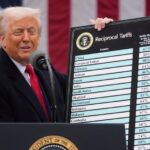

President Joe Biden’s border chief says Americans need more migrants to fill jobs — even as House legislators debate his possible impeachment and the Senate considers a legislative deal he helped broker.
Mayorkas made his demand for a high-migration, low-productivity economy during a softball interview with the New York Times:
Wouldn’t it be more orderly, and wouldn’t it be responsible governance to be able to deliver a lawful pathway to fill what we have, which is a labor need, and cut the exploitative smugglers out and give individuals a path to arrive lawfully, safely, in an orderly way, to perform labor that we need? They can send remittances home. They can return home when their work is done. Isn’t that an element of a workable immigration system?
Interviewer Lulu Garcia-Navarro passively accepted his family-separating, George W. Bush-like “Any Willing Worker” pitch as she suggested the nation’s migration debate is really about how to ensure more orderly migration:
Q. So what I’m hearing you say is that you’d like to expand legal pathways in order to relieve some of the pressure on the Southern border where people come in illegally?
A. Yes, and to fulfill one of the goals of our immigration system.
Mayorkas did not mention that a primary legislated goal of the immigration system is ensuring that American families are not discarded by employers’ use of cheap and compliant foreign labor.
Since 2021, Mayorkas has allowed more than 6.2 million migrants into Americans’ housing, schools, hospitals, and workplaces. His policy has pressured down Americans’ wages. It also boosted rents and housing prices and inflicted more divisive diversity on Americans’ society. The inflow has also pushed many native-born Americans out of careers in a wide variety of fields and spiked the number of “Deaths of Despair.”
Mayorkas heads the Department of Homeland Security that guards the nation’s borders. But he has repeatedly called for a Canadian-style migration system in the United States that would supply companies with all the labor they prefer. Yet Canadians increasingly recognize that their migration strategy has caused great damage to their people and economy.
However, Mayorkas’ pro-Wall Street economic agenda is downplayed by GOP legislators and by most reporters. The establishment’s silence is a tacit admission that the dispute is powering the nationwide populist upsurge that sidelined Jeb Bush and elected President Donald Trump in 2016.
RELATED — Exclusive: Bus of Illegal Immigrants Sent by Gov. Abbott Arrives in NYC
Emma-Jo Morris / Breitbart News
That democratic pushback is powering the House impeachment of Mayorkas, many court battles, and public opposition to the establishment-drafted border-management plan in the Senate that would legalize much illegal migration.
Mayorkas played a central role in drafting the planned legislation with Sen. James Lankford (R-OK) and Sen. Mitch McConnell (R-KY).
The interviewer also ignored many dramas in Mayorkas’ tenure — including his 2021 decision to stop deporting illegal migrants once they cleared the border, and the overall impact of his favoritism towards migrants — including more anti-Semitic attitudes and racial appeals — and his moral and legal duty to Americans, including roughly 5 million men who have fallen out of the workforce.
Similarly, the New York Times article sidelined the huge death toll among migrants trying to reach Mayorkas’ welcome, and his failure to curb the cross-border flow of drugs that kills roughly 70,000 Americans each year from drugs. It was also silent about Mayorkas’ recent deals with Mexico to steady the inflow of economic migrants.
Instead, the interviewer mischaracterized Americans’ rational and legitimate concerns about Mayorkas’ nation-changing immigration policies, and allowed Mayorkas to smear those concerns as unreasoning “hate”:
Q. Some people argue that the Biden administration’s mishandling of the border has given those who are anti-immigrant [some] ammunition to advocate for draconian cuts to immigration, like mass roundups of undocumented people and shutting the border down.
A. I’ve never understood individuals with anti-immigrant sentiments to need ammunition. Hate is its own ammunition. And regrettably, we have seen that [hate] materialize in many different ways … in this country.
The interviewer did not ask, and Mayorkas did not explain, why he dismissed the public’s majority criticism of his migration policies as mere “hate.”
In general, Mayorkas gets kid glove treatment when he speaks to the national press.
For example, the Associated Press also interviewed Mayorkas and let him dodge the awkward issues of his pro-migration skew, record on drugs and migrant deaths, wages and housing, law, and polls. But the Associated Press article did include this bouquet:
Supporters say he is driven by commitment to public service and that impeachment is completely at odds with what they know of the law-and-order-minded former prosecutor.
Cecilia Munoz, who worked closely with Mayorkas during the Obama administration, praised his tenure as head of the U.S. Citizenship and Immigration Service, where she says he put in place a program giving protection from deportation to migrants brought to the border as children in “light speed.” She also noted his efforts to get Haitian children, orphaned by the 2010 earthquake, into the U.S. to people who wanted to adopt them.
The New York Times‘ softball interviewer, Garcia-Navarro, is on safe ground with her pro-migration editors.
For example, a February 2 article by the newspaper’s Editorial Board complained that the border deal is threatened because “Republican leaders … are engaged in other forms of sabotage.” The deal should go through, said the board, because it will legalize more immigration:
The deal under construction in the Senate reportedly would raise the bar for asylum claims and provide funding to expedite decisions. It would expand other forms of legal immigration [emphasis added], which could help to take some pressure off the asylum process.
…
[Congress] needs to act so that people without legitimate claims cannot walk into the United States — not least so that others are able to do so [emphasis added].
Extraction Migration
Since at least 1990, the federal government has relied on Extraction Migration to grow the economy after it allowed investors to move much of the high-wage manufacturing sector to lower-wage countries.
The migration policy extracts vast amounts of human resources from needy countries. The additional workers, consumers, and renters push up stock values by shrinking Americans’ wages, subsidizing low-productivity companies, boosting rents, and spiking real estate prices.
The economic policy has pushed many native-born Americans out of careers in a wide variety of business sectors, reduced native-born Americans’ productivity and political clout, reduced high-tech innovation, crippled civic solidarity, and allowed government officials to ignore the rising death rate of discarded Americans.
[embedded content]
The policy also sucks jobs and wealth from heartland states by subsidizing coastal investors and government agencies with a flood of low-wage workers, high-occupancy renters, and government-aided consumers.
The colonialism-like policy has also killed many thousands of migrants, including many on the taxpayer-funded jungle trail through the Darien Gap in Panama.
[embedded content]






